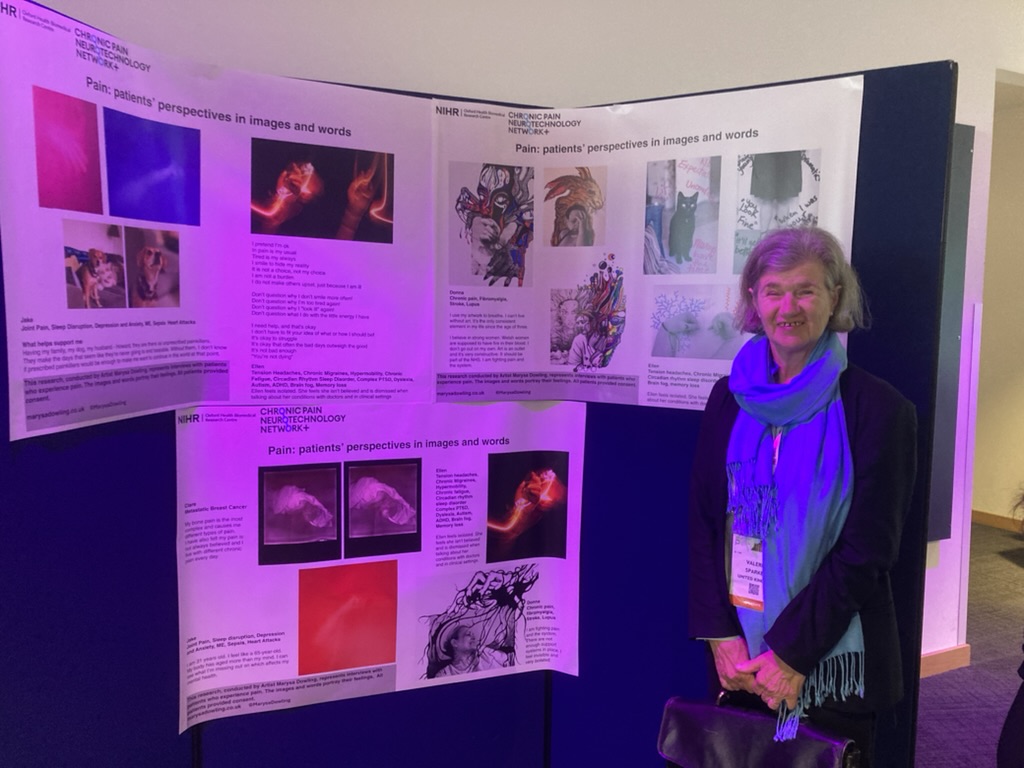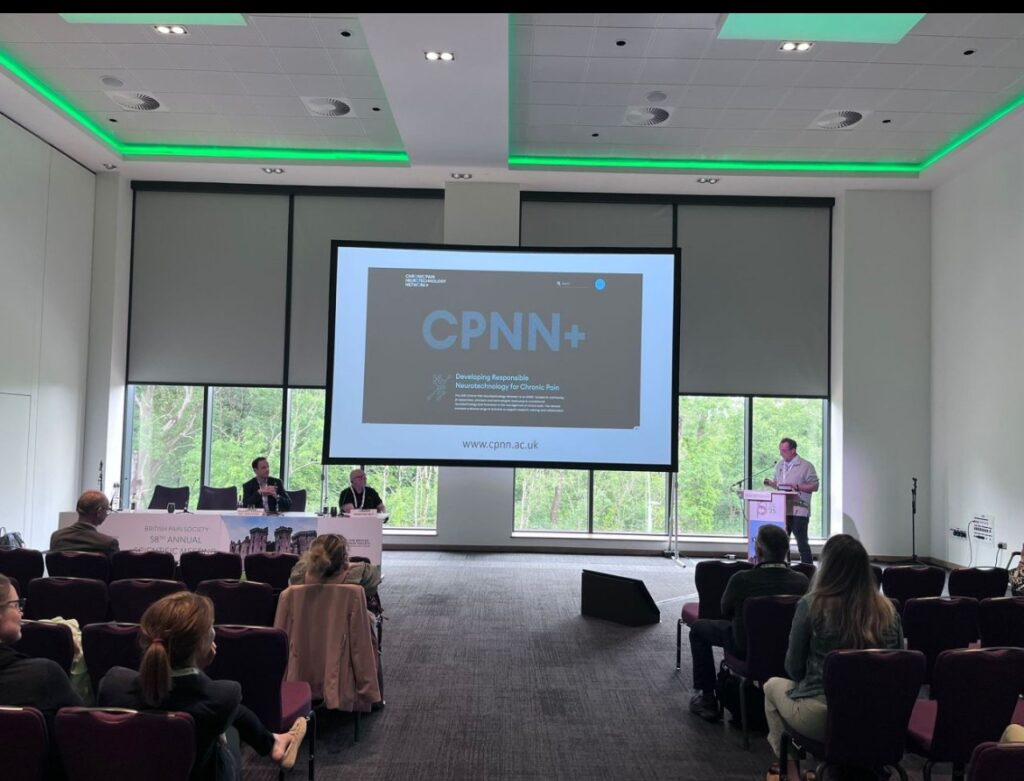Viewing archives for Uncategorized
Virtual Reality, Nature & Glastonbury 2025
Dr Sam Hughes, a lecturer in Pain at the University of Exeter and one of CPNN+’s co-applicants, will be hosting a public engagement stand at the Future Sciences Field based on nature & virtual reality. Dr Hughes will also be doing a panel discussion on the Laboratory stage on ‘Nature and Mental Health’ with Professor Gilly Forrester (University of Sussex) and author Joanne Mallon. More details can be found here: https://news.exeter.ac.uk/faculty-of-health-and-life-sciences/vr-nature-experience-for-glastonbury-revellers-to-showcase-health-benefits/
Neurofeedback Workshop
The CPNN+ held their annual 2-day workshop at the University of Glasgow last week on ‘Neurofeedback’. Pictured are CPNN+ team members; Val Sparkes (co-applicant), Ben Seymour (P.I) & Aleksandra Vuckovic (co-applicant & event lead). The workshop consisted of 12 guest speakers presenting on their own specialties and/or research. Along with fun, practical demonstrations each afternoon, led by G.TEC, Brain Train UK, Michael Lührs (Brain Innovation B.V.) and Frank Pollick (School of Psychology and Neuroscience, University of Glasgow). More details can be found under our ‘activities’ tab. A huge thank you to all involved!
British Pain Society 2025
The CPNN+ team recently attended the annual scientific meeting in Newport on 3-5th June 2025. A session on Future technologies was presented by our network co-applicants: ‘Rehabilitation Methodologies’ by Helen Dawes, ‘Future technologies: engineering considerations’ by Alexandra Vuckovic & ‘Using immersive virtual reality to deliver nature-based interventions for chronic pain’ by Sam Hughes (all pictured). Our P.I, Ben Seymour, presented on ‘The neuroscience of pain: from brain circuits to clinical care’ on the final day. In addition, Valerie Sparkes presented a poster on our current artistic PPI project, ‘Living with Pain’. To find out more about this project, please visit https://www.marysadowling.co.uk/living-with-pain/.


Oxford BRC Heath Research Showcase
Colleagues from CPNN+, the University of Oxford & Oxford BRC’s Pain Theme, along with other stall holders showcased Oxford’s world class – research to patients and members of the public at The Westgate Shopping Centre in Oxford on Thursday 29 May 2025. It was a great opportunity to showcase current & previous research projects demonstrating its benefits and encouraging more people to participate or get involved in research. The event overall demonstrated the diversity of medical research in Oxford.
CPNN+ at EFIC 2025
https://europeanpainfederation.eu/efic2025/scientific-programme/
Neurotechnology Networks Ethics in Neurotechnology Workshop
10.30 – 16.00 Wednesday 9th April 2025
Imperial College London, South Kensington Campus, Exhibition Road, London, SW7 2AZ.
For more information, please visit https://neuromodplus.org/event2/neurotechnology-networks-ethics-in-neurotechnology-workshop/ or contact abigail.stuart@ndcn.ox.ac.uk
Chronic Pain Neurotechnology Network https://cpnn.ac.uk/
CloseNIT https://research.ncl.ac.uk/close-nit/
NCode https://www.n-code.org/
Neuromod+ https://neuromodplus.org/
Respect 4 Neurodevelopment https://respect4neurodevelopment.com/
Advanced Pain Discovery Platform 2025 annual conference
The APDP Annual Conference 2025 will be held on Tuesday 3rd June 2025, at the ICC Wales, in Newport.
For more details and to register your lace, please visit https://apdp.community/event/advanced-pain-discovery-platform-annual-conference-2025/
It is being held in conjunction with the British Pain Society’s Annual Scientific Meeting (https://bpsasm.org/). All APDP members who contribute to pain research in the UK are invited to attend. Registration for the APDP Annual Conference is free of charge, but spaces are limited.
Registration for our Neurofeedback workshop is now open!
To register, please visit https://forms.office.com/e/82FQyyQzzX
Open to all, and aimed at early career researchers, our CPNN+ Neurofeedback workshop will include talks from various guest speakers, two afternoon workshops and dinner on the first evening. Access the ARC website here – https://www.gla.ac.uk/research/arc/
The aims of our workshop will include:
• An interdisciplinary workshop that aims to explore the theoretical and practical aspects of neurofeedback with a focus on its application on pain treatment.
• There will be morning talks across a range of translational topics that will cover neurofeedback in invasive and non invasive experimental human models, methodological considerations and clinical studies. Ethical aspect of using neurotechnology and its placebo effect will also be discussed.
• Afternoon interactive workshops will focus on how to design and implement EEG based neurofeedback and introduction to real time fMRI with a demonstration of its experimental setup.
CPNN+ travel award funding now open!
We are looking to support ECR’s by awarding up to £2,000 per applicant to support with any upcoming travel, conference registration fees, training and development opportunities etc. These awards are open to ECR’s in the neurotechnology, chronic pain community. Early Career Researchers must be within eight years of their PhD viva (this excludes any time taken for parental leave, carers leave, sick leave, or any other similar reason). Please note, that if there are additional circumstances that are relevant to this timeframe, please discuss with us and we can review this. We invite applications from UK institutions only. Applicants must also meet the UKRI criteria to receive funding. Unfortunately, due to funding restrictions, we are unable to accept applications from students. Please get in touch with abigail.stuart@ndcn.ox.ac.uk for our full terms and conditions and to complete an application form. Please also visit our opportunities page to find out more https://cpnn.ac.uk/opportunities/
CPNN+ P.I awarded ARIA funding for future adoption of neurotechnologies
Prof. Ben Seymour has been awarded funding to allow researchers from Oxford, as well as Warwick Business School, to develop a new tool for predicting patient preferences and possible uptake of interventional neurotechnologies. Ben says:
‘We’re really excited about this opportunity to think clearly and openly about the really transformational interventions that we can design and be part in some way of the next generation of treatments of neurological and mental health challenges. We’re an interdisciplinary team spanning clinical neuroscience, behavioural and health economics, computational psychology, and game theory. We work together as part of the Oxford Health Biomedical Research Centre, and have come together with Warwick Business School to create this unique team that spans cutting-edge science and health policy’. For more information, please visit https://www.aria.org.uk/opportunity-spaces/scalable-neural-interfaces/precision-neurotechnologies/
